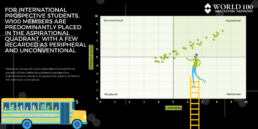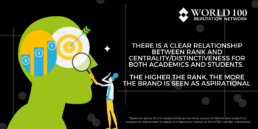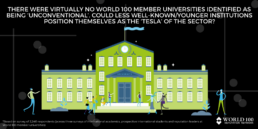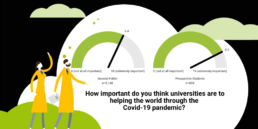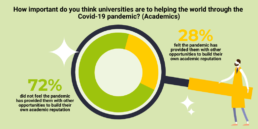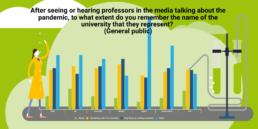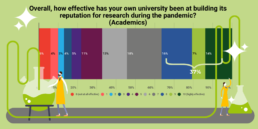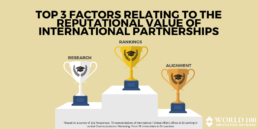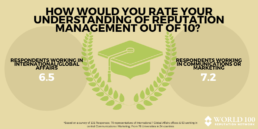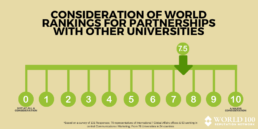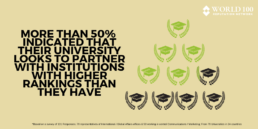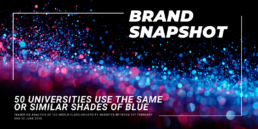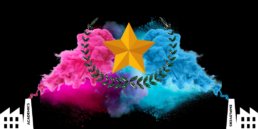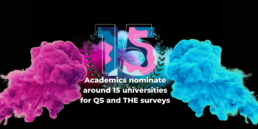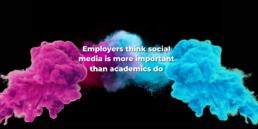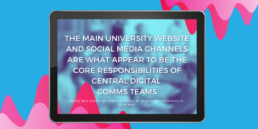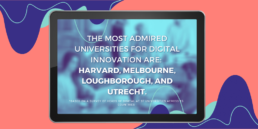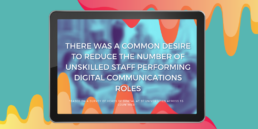World 100 Research Project 2024: Resources and Structures
Fit for the Future: structures and resources for delivering effective reputation management
This survey aims to build a picture of the approaches to reputation management being taken by the world’s best universities and the resources they are deploying. The purpose is to provide global benchmarks to help leaders develop their operations. The results of this survey will be compared to previous iterations completed in 2007, 2015 and 2020, providing insights into global trends.
The project is being delivered by the World 100 Reputation Network – a group of 50 of the world’s best universities spanning 13 countries, managed by Times Higher Education. The network focuses on membership engagement opportunities, research, communications evaluation and training. More information about the Network is available at https://theworld100.com.
The summary findings will be available to all those who complete the questionnaire. A more detailed report is available to members of the W100 Network. Further details of W100 Research projects are available at Research Projects – The World 100.
This survey is being sent to leaders in reputation management / communications / marketing at universities in the top 200 of the leading global rankings. We are also conducting focus groups and interviews with members of the World 100 Reputation Network, please email info@theworld100.com if you would like to be involved in an interview or focus group. The findings will not be attributed to individual universities or respondents. But it will help us if you provide your name and university, so that we can analyse findings in more depth and explore if there are correlations or patterns; it will also allow us to ask you for more detailed explanations or examples where that is necessary or useful.
All results will be anonymised.
Please note: This survey is intended to be answered by the person with the most senior role in reputation management at your university
Having issues accessing the survey?
Click the button below to access a Word version on the survey, and please submit your completed form to info@theworld100.com
Respondents of the survey can compare their university’s results on:
- Reputation staff numbers (crisis communications, brand, marketing, rankings, international etc)
- Operational budget
- Salaries for senior reputation leaders
- Key performance indicator
- Trend data - developments in spending on university reputation
What will you receive?
For every university that answers the survey, we will send you a report of the findings, so that you can benchmark the amount you spend on reputation and the way your structure your teams against other world-class universities.

Become a Member
The World 100 Reputation Network is a group of the best universities in the world, delivering research that enhances reputation and offering leaders the chance to develop their own careers on a global stage. Members benefit from events and study tours, training, monthly media monitoring, and unique reputation research to provide institutional advantage.
Symbiotic? Exploring the Relationship Between Reputation and Sustainable Development 2022/2023
The World 100 Network annual research project always aims to push the boundaries of understanding about global university reputation. The project for the 2022/23 membership year sought to gain some further understanding of the relationship between reputation and the recent focus of many universities on promoting activity around the sustainable development agenda.
How universities can demonstrate the impact of their research, teaching and engagement activities has become critical to success in an increasingly competitive and scrutinised higher education environment.
The United Nations Sustainable Development Goals (SDGs), published first in 2015, have achieved broad support as a way of measuring progress in addressing key global challenges by governments, Non-Governmental Organisations (NGOs), businesses and research funders.
Progress against the SDGs is therefore being used increasingly by universities worldwide as a way to demonstrate the impact of their research and teaching, and to build reputations with key stakeholder groups around the positive effect that they have on society.
This project asked several key questions:
- What does data from the THE Impact Rankings tell us about the relationship between reputation
and sustainable development? - What do key stakeholder groups think of the relationship?
- How are World 100 member universities representing their impact in their communications
activity? - What is best practice in building reputation through impact and sustainable development?
A few key findings
Research Downloads:
Available to Members Only
Want to continue reading?
The rest of this content, and much more, is only available to our members. Consider becoming a member today…
If you are already a member please login to view this content.
PDF Exploring the Relationship Between Reputation and Sustainable Development 2022/2023- Full Report
Download file
PDF Exploring the Relationship Between Reputation and Sustainable Development 2022/2023 - Executive Summary
Become a Member
The World 100 Reputation Network is a group of the best universities in the world, delivering research that enhances reputation and offering leaders the chance to develop their own careers on a global stage. Members benefit from events and study tours, training, monthly media monitoring, and unique reputation research to provide institutional advantage.
How Do Universities Stand Out: 2021/22
Whilst contradictory in nature, a university’s goal is to make themselves both top of mind, or central, and distinctive in the sector in order to stand out. Understanding and ultimately influencing its brand perception is the way an institution can accomplish this.
Considering brands, Coca-Cola (in soft drinks) and McDonald’s (in fast food) are demonstrative examples of centrality – the first ones that come to mind in a large pool of comparable brands. On the other hand, brands high in distinctiveness are recognised for their uniqueness and rarely have direct rivalry with other relevant industry brands. Tesla (in automotive) is a prime example of this.
The World 100 Research Project for 2021/22 aimed to explore how the brand positioning of a university, from a centrality-distinctiveness perspective, can be influenced.
A challenge faced by higher education sector is setting one’s institution apart in a crowded industry that is fiercely competitive. This project critically analysed the brand positioning of universities and the interplay of reputation, ranking and pricing in the mix. Key elements of the research include surveying crucial international stakeholders such as prospective students and academics, and collecting views from institutional reputation leaders globally.
To help us cater reports to W100 members, we invited reputation leaders to participate by filling out a survey. These additional views will allowed for further, tailored analysis. The survey closed in September 2022, and the final report was released in October 2022.
The research, which took place between June and October 2022, aimed to explore several key questions:
- What makes a university distinctive, and how does it stand out from others? Do universities that are considered more distinctive have a better overall reputation?
- Does brand awareness impact reputation? Could how well-known a university is factor into a judgement of institutional reputation?
- What are the factors that influence the cost of tuition? Do higher ranked universities garner higher tuition, or could a higher rank justify a tuition fee price premium?
COVID-19: Taking the Temperature of the Crisis
COVID-19 has tested every university in ways that would have been unimaginable at the end of 2019. This has been the ultimate reputation test, and the World 100 Reputation Network was keen to chart the journey as best we can, to shed light on the challenges for reputation leaders in a unique time.
Last year we asked 10 quick questions of leading global universities (ranked in the top 200 of the world rankings) around managing the crisis of COVID-19 and their reputations. The longitudinal survey began in March 2020 and aimed to show the development of the crisis in terms of pandemic communications, university reputation and various other factors.
Now, more than a year into the pandemic, we invited universities to think about the same questions to reflect on what’s happening now compared to six months ago. The survey ran in June 2021.
Data from the most recent survey is available below in an interactive dashboard. You can also visit our webinar page to explore the online sessions we hosted to explore the data from earlier waves of the study in more detail with industry experts.
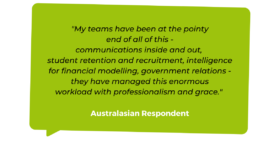
Interactive Dashboard
Become a Member
The World 100 Reputation Network is a group of the best universities in the world, delivering research that enhances reputation and offering leaders the chance to develop their own careers on a global stage. Members benefit from events and study tours, training, monthly media monitoring, and unique reputation research to provide institutional advantage.
The Reputation Opportunity: 2020/21
The pandemic has highlighted the role of universities and academic research as a key contributor to society as never before. But have institutions been able to gain a reputation advantage from research they have shared during the period?
The World 100 research project for 2020/2021 explored how universities have used the visibility of COVID-19 research to build profile.
Key elements of the research included undertaking public polling in a number of countries, surveying global academics, and collecting research evidence from around the globe.
We also explored the experiences of W100 members – and particularly those teams involved with promoting research – to understand your experiences during the pandemic.
The research also included interviewing media relations and research promotion leads.
The research, which took place between July and October 2021 aimed to explore three key questions:
- How well do key audiences understand the role of universities in supporting Covid-related scholarship – epidemiology, treatments, vaccines, behavioral psychology, economic impacts/recovery?
- Has the visibility of high-profile academics translated into reputational benefits for their universities?
- What’s the impact of negative views of science or COVID-19 related research during pandemic (herd immunity, anti-lockdown feeling) on universities?
Research Downloads:
Available to Members Only
Want to continue reading?
The rest of this content, and much more, is only available to our members. Consider becoming a member today…
If you are already a member please login to view this content.
PDF The Reputation Opportunity 20/21- Full Report
PDF The Reputation Opportunity 20/21- Executive Summary
Become a Member
The World 100 Reputation Network is a group of the best universities in the world, delivering research that enhances reputation and offering leaders the chance to develop their own careers on a global stage. Members benefit from events and study tours, training, monthly media monitoring, and unique reputation research to provide institutional advantage.
International Reputation Tracker
The Pilot Year
The 2019/20 membership year was the Year 0 pilot year for the International Reputation Tracker. All members were invited to take part in the Tracker as the main annual research project for the year.
Unfortunately, the Covid-19 pandemic caused us some difficulties along the way – but several members were able to successfully engage their staff, students and alumni with the Tracker surveys. Thank you to all who have contributed.
What did the pilot project include?
Following the model of the UK Reputation Tracker, the International version included surveys for three internal audiences (staff, students and alumni) and two external audiences (international education agents and prospective international students).
In addition, secondary metrices are:
- Social media KPIs for Twitter, Facebook, Instagram and YouTube
- International postgraduate degree pricing for four subject areas – Law, Medicine, Engineering and MBA
- International media monitoring from the W100 Aurora tool
- Rankings
Resources and Structures for Reputation Management
As several members told us they were keen to be able to benchmark spend and resourcing for reputation management, we explored the idea of incorporating a resources and structures audit into the International Tracker. Members, and other world 200 ranked universities, were invited to complete the audit over the summer.
Unlike other areas of the Tracker, this data will be reported anonymously.
Year 1
Having reflected on the pilot Year 0, we are launching the 2021 International Tracker which will run alongside National Trackers.
The International Reputation Tracker includes primary research with prospective international students, international education agents and academics working at top universities around the world as well as global secondary data. It can also incorporate surveys with current students, staff and alumni at your own institution, benchmarked against internal surveys at other Tracker members.
If you are interested in learning more, please contact Sarah at sarah.thomas@theworld100.com
Login to the Dashboard
The Dashboard brings together the data from all elements of the International Reputation Tracker. Click below to login. You will be prompted to enter a username and password. We have emailed main W100 contacts with their login information, if you don’t have this, please contact sarah.thomas@theworld100.com
As presented at our virtual conference
The W100 annual conference ran a virtual week-long festival of reputation in November 2020.
We presented on the outcomes of the International Reputation Tracker pilot during the event. W100 members have access to the presentation on-demand for this year.
Click here to read more about the conference
Our next virtual conference will be in April 2024. Find out more information here
Resources and Structures 2020
University communications, marketing, and international teams have been at the forefront of their institutions’ responses to the challenges presented by the Covid-19 pandemic. But do you feel that you have enough resources and the right structures to meet the challenge?
The World 100 Reputation Network, the only group for leaders in reputation management at top global universities, is undertaking a survey to uncover what is being spent on reputation, and how the activities are structured.
All results will be anonymised.
Please note: This survey is intended to be answered by the person with the most senior role in reputation management at your university
Respondents of the survey can compare their university’s results on:
- Reputation staff numbers (crisis communications, brand, marketing, rankings, international etc)
- Operational budget
- Salaries for senior reputation leaders
- Key performance indicator
- Trend data - developments in spending on university reputation
What will you receive?
For every university that answers the survey, we will send you a report of the findings, so that you can benchmark the amount you spend on reputation and the way your structure your teams against other world-class universities.

Become a Member
The World 100 Reputation Network is a group of the best universities in the world, delivering research that enhances reputation and offering leaders the chance to develop their own careers on a global stage. Members benefit from events and study tours, training, monthly media monitoring, and unique reputation research to provide institutional advantage.
COVID-19: Taking the Temperature of the Crisis
COVID-19 has tested every university in ways that would have been unimaginable at the end of 2019. This has been the ultimate reputation test, and the World 100 Reputation Network was keen to chart the journey as best we can, to shed light on the challenges for reputation leaders in a unique time.
Last year we asked 10 quick questions of leading global universities (ranked in the top 200 of the world rankings) around managing the crisis of COVID-19 and their reputations. The longitudinal survey began in March 2020 and aimed to show the development of the crisis in terms of pandemic communications, university reputation and various other factors.
Now, more than a year into the pandemic, we invited universities to think about the same questions to reflect on what’s happening now compared to six months ago. The survey ran in June 2021 and is now closed. The dashboard below will be updated shortly.
2020 data from the survey is available below in an interactive dashboard. You can also visit our webinar page to explore the online sessions we hosted to explore the data in more detail with industry experts.

Interactive Dashboard
Become a Member
The World 100 Reputation Network is a group of the best universities in the world, delivering research that enhances reputation and offering leaders the chance to develop their own careers on a global stage. Members benefit from events and study tours, training, monthly media monitoring, and unique reputation research to provide institutional advantage.
Riding the Tiger: 2018/19
International partnerships between universities have traditionally been forged around student mobility, research collaborations, networks, and recruitment progression routes, which are determined by a range of factors (academic, financial etc.). However, the role of reputation in partnerships, and in particular those that universities describe as ‘strategic’, has not been comprehensively researched. The Word 100 Reputation Network has for the past decade and more undertaken annual research projects to push the boundaries of the understanding of reputation in global high education.
Our 2018/2019 Research project aimed to answer some key questions around the role of reputation in international partnerships. Who is responsible within institutions for the development and promotion of partnerships? What are the keys to successful working relationships amongst internal stakeholders? How effectively are universities using international partnerships to enhance their institutional brand and global profile and how prepared are they for any negative reputational changes their partners might encounter?
In consultation with World 100 members, we created an online survey tool to explore the role of reputation in international partnerships. The survey was designed to be completed by senior colleagues working in both communications and marketing and international/global affairs at top universities around the world. The two routes largely mirrored one another with slight variations to assess the current and perceived ideal level of support from corporate communications team in the development and promotion of international partnerships.
Between April and June of 2019 we invited directors of both functions at universities in the world’s top 200 (based on ranking in each of the four major world rankings used for Network membership eligibility – THE, QS, ARWU and US News and World Report), including those ranked as the top young universities.
Survey Topics
- Responsibility for international partnerships
- Reputation and partner appeal
- The importance of reputation when developing new international partnerships
- Rankings
- Using partnerships to build global profile
- Identifying international partnerships with the greatest potential for reputational impact
- Indicators of reputational value
- Checklists
- Measuring success and assessing brand value
- The impact of negative changes to reputation
- Collaboration between communications and international/global affairs
- Identifying strategic partners
- Communications strategies
When we look for international partners,
We always look at their reputation
The final report from the research, Riding the Tiger: Enhancing the Role of Reputation in International Partnerships, was published in November 2019. Members of the W100 Network can access the report from the news and resources page. A summary of the report is available to non-Members that filled in the survey.
The research also formed the basis of a webinar giving members an exclusive opportunity to share experiences and delve deeper into the research findings.
Become a Member
The World 100 Reputation Network is a group of the best universities in the world, delivering research that enhances reputation and offering leaders the chance to develop their own careers on a global stage. Members benefit from events and study tours, training, monthly media monitoring, and unique reputation research to provide institutional advantage.
Brand Snapshot: 2017/18
Our 2017/18 research project, Brand Snapshot, reviewed the online brand profile of the best universities in the world – the top 50 in the world in all four main global rankings, plus W100 members and nominated peers.
Universities are putting more energy and thought into expressing their brand position as they compete for research funding, top students, and world-class academics. But there is a very weak understanding of brand difference or any formal impact assessment in the higher education sector other than via the rankings. As websites are one of the main ways audiences interact with universities and universities articulate their ‘brand’, our research project looked at brands online.
Each university was assessed by two independent analysts on key brand attributes between January and June 2018.
The research found that top universities really struggle to look or sound different when their websites are compared. 50 universities use the same or similar shades of blue, and the best online brands are not necessarily the highest ranked.
The project analysed the websites of 100 global institutions, finding that they adopted the same language, with phrases like ‘world impact’ and ‘challenging’ being repeated regularly.
“In such a competitive higher education world, universities have a long way to go in engaging the busy reader who looks at their website,” said Louise Simpson, Director of the World 100 Reputation Network. “Too many of them look and sound the same, and can’t explain what it is that makes them special. They really need to be much bolder both in the way they communicate, and in what they communicate. Good branding requires both creativity and decisiveness!”
Hypotheses to be Tested
• Student brands are better articulated than research brands.
• Brand propositions are not well differentiated between world top-ranked
universities; brand assets are similar among world top-ranked universities
• Brands are separated out between research, study and international, rather than
offered as an integrated expression of the whole university.
• There is no correlation between a high ranked university and a university with a
strong brand impact.
Our analysts looked at and assessed:
- First impressions – this included analysis of the logo, homepage design, use of images
consistency of design and initial content of homepage - News brand – analysts looked for how up-to-date the news is, how engaging it is, how it is
presented and the balance of content - Student brand – analysts looked for distinctiveness, prominence on the website and how
well the students’ voice is represented on the website - Research brand – analysts looked for distinctiveness, prominence on the website and how
well the academics’ voice is represented on the website - International brand – analysis of international activities and presence including strong
international partnerships which can back up claims of being global - City/location band – analysts looked at the extent to which the location of the university
is used as a brand asset - Partnerships –evidence of productive, fruitful strategic partnerships
- Institutional brand – recording straplines, campaigns, main messages and reputational
claims the university makes - Social media – analysts looked at how consistent the social media brand is with the
website brand
Fifty Shades of Blue:
Global universities struggle to look or sound distinctive
The Brand Snapshot research revealed:
Very few employed the techniques of brand campaigns that commercial companies use to clarify their points of difference or engage consumers with humour or succinct messages.
Those that appeared most distinctive were prepared to say what they were really focused on, with engaging story-telling, and strong visual and personalised approaches. Such as Helsinki, with its powerful public engagement campaigns and its revolutionary Think Corner, or Manchester, with five ‘research beacons’ of excellence.
North American institutions were less good at explaining their global presence or international offerings. Asian universities tended to have formal approaches to language and old-fashioned designs. Across all continents, universities relied on long lists of rankings or partnerships to justify their brand, rather than explain what they were really good at.
The top 25 online university brands in the W100 study were dominated by universities from the English-speaking world, such as Melbourne, Illinois, UBC, Birmingham and Queen’s Belfast; Keio University (Japan) stood out among Asian global universities; and Groningen, Helsinki, Aarhus and Karolinska were the European online brand leaders.
The final report from the research, is available for members of the W100 Network via news and resources page.
Further World 100 Research
- Riding the Tiger: Enhancing the Role of Reputation in International Partnerships
- The Digital Approach: Resources and structures for online communications
- Website Best Practice for World-Class Universities
- Rise and Fall: Managing reputation associated with significant world ranking change
- The R-Word: Communicating research at world-class universities
- more!
Research Downloads:
Available to Members Only
Become a Member
The World 100 Reputation Network is a group of the best universities in the world, delivering research that enhances reputation and offering leaders the chance to develop their own careers on a global stage. Members benefit from events and study tours, training, monthly media monitoring, and unique reputation research to provide institutional advantage.
The Ranking Influencers: 2016/17
Academics and universities know that data matters when it comes to world university rankings. As a result, tremendous effort goes into getting research in the right journals and maximizing citations. However, what is sometimes forgotten is that the biggest indicator of ranking is reputation, i.e. the opinion of published scholars and employers. This actually forms a third of the final THE score and half of the QS score. Thousands of academics and employers from across the globe determine which universities are the best in their fields. How do they make their choices?
Our 2016/2017 Research project aimed to explore how academics and employers vote, their influence and its impact on university reputation by answering the following key questions: What influences academics, professional staff and employers to consider their nominated universities to be the absolute best of a world-class elite group? How readily could their perceptions be altered year to year? And ultimately, what can those in charge of universities’ reputation management do to put their institutions in the spotlight for these audiences?
We employed both quantitative and qualitative research methods, using a global online survey of academic faculty and professional staff working at top universities, qualitative interviews with academic faculty at global universities and a global online survey of employers to inform the research. In total, 103 universities, and their faculty/staff, across 30 countries contributed to this research by way of facilitation, interview or survey completion.
The research found that whilst many academics see the rankings as fundamentally flawed, the rankings are the first place most go to get a feel for a university’s reputation or see how they their own institution is performing.
What the research explored:
- Understanding the ranking surveys
- How much does reputation matter?
- Hallmarks of strong university reputation and the influencing factors
- The importance of individuals
- The best universities and the factors considered
- General view and usage of world rankings
- Awareness, trust, participation and individual elements of the reputation surveys in world rankings
- Catching attention and how universities that are unknown to an academic can be noticed
- Which groups influence the influencers
- Ranking influence and gaming of the results through recommendations
- Current practice when it comes to ranking strategies
When nominating universities in the rankings, personal connections are important for establishing reputation
The final report from the research, The Ranking Influencers: How Academics and Employers Determine the Best Universities, was published in November 2017. Members of the W100 Network can access the report from the news and resources page. A summary of the report is available to non-Members that filled in the survey.
The research also formed the basis of a presentation given at several national and international conferences, and it has been referenced by universities globally to inform decision-making within marketing and communications.
Become a Member
The World 100 Reputation Network is a group of the best universities in the world, delivering research that enhances reputation and offering leaders the chance to develop their own careers on a global stage. Members benefit from events and study tours, training, monthly media monitoring, and unique reputation research to provide institutional advantage.
The Digital Approach: 2017/18
Digital communications is essential for all global organizations but critical for those aimed at young people. In addition to our annual research project for W100 members, the World 100 set out to explore approaches to online communications at top global universities. The research explores budgets, teams, in-house capacity, outsourcing, approaches to monitoring and evaluating digital communications, policies and guidelines, internal training and more – everything that covers their digital approach.
The survey was developed in conjunction with digital communications representatives from seven leading global universities in the UK, Europe and North America. The research findings are based on survey responses from heads of digital at 37 universities across 15 countries.
The research indicates that digital is a highly important, and increasingly intrinsic part of communications in universities. Most communications will be digital communications in the future, so teams are less likely to be separate from the rest of communications and marketing or even have digital in their job title, as everyone will be ‘digital’. However, there is probably a generational disconnect, with senior leaders being less familiar with using digital (especially twitter) than younger managers.
The research covers:
- Team size and structure
- Non-central digital communications
- Responsibility for digital communications
- Twitter communications
- In-house capacity and outsourcing
- Strategies for digital communications
- Resourcing, budget and salaries
- Intranets
- Rating digital communication activities
- Training for digital communications
- Monitoring and evaluation
- Challenges and the future
- Identifying best practice
'Digital communication' will become 'communication'. There will be no difference.
The final version of the report from the research, The Digital Approach: Resources and structures for online communications, was published in June 2017. It is availble to members via the news and resources page.
Become a Member
The World 100 Reputation Network is a group of the best universities in the world, delivering research that enhances reputation and offering leaders the chance to develop their own careers on a global stage. Members benefit from events and study tours, training, monthly media monitoring, and unique reputation research to provide institutional advantage.





